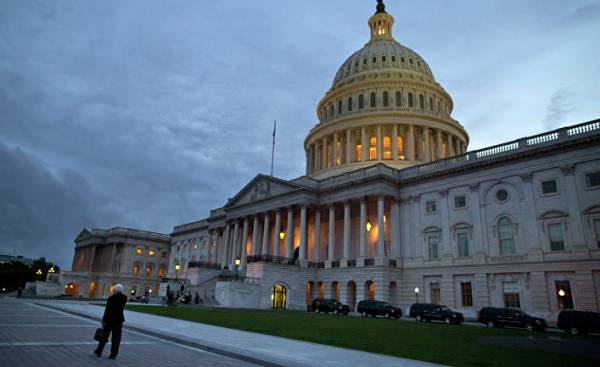
The bill on sanctions against Russia, Iran and North Korea, after a long campaign in the media and numerous attacks on official and unofficial propaganda finally approved in the U.S. Congress. From the point of view of many political observers of the articles of the draft law on sanctions against Iran and North Korea with the exception of a number of parts are in General a repetition of the past, whereas articles against Russia injected a new “base” for the application of sanctions, and also link the Trump hand in the negotiation process with the Russian leader Vladimir Putin. This is especially true of questions of cancellation (full or partial) of anti-Russian sanctions. Now it becomes a law of Congress.
The bill, many in Washington and in the United States were to cause the question of whether the return tramp it to Congress without his signature for further consideration. Or will he veto it? The answer to this question will be performed in two days, but multiple sources and officials in the White house claim that the President of the United States — although clearly not delighted with the approval by Congress of this law, you still sign it for further execution. And someone still suggests that trump will find a way to veto it.
Anyway, first reactions to this bill made in most countries of Europe, Asia, Latin America, and in Canada, were of a distinctly negative character. For example, in Europe, Ministry of foreign Affairs of France made a statement urging Congress to reconsider the bill, calling it an obstacle to further political negotiation process, a hindrance to the resolution of conflicts between countries, as well as another means to foment tension and terrorism. The German government also condemned the law in his official statement. It is especially not happy with the part, which envisages tougher sanctions against Russia. The conviction of the German government, the bill will become an obstacle to the implementation of agreements on gas supplies from Russia to Europe through Germany and may also prevent the settlement of the conflict in Eastern Ukraine.
The Chinese government also condemned the initiative of the American congressmen and called it another step to the escalation of regional crises, and warned the United States and an office of the trump from complete isolation in the international arena. Most of the countries of Latin America and Canada also criticized the congressional bill for sanctions, calling it a great political mistake that will exacerbate the already difficult and tense atmosphere in international relations. Russia’s President Putin in his first statement after the results were known a vote in Congress, called it “humiliating” for Russia as a state and its people, and said the new us sanctions “completely contrary to international law” and that his country “will not leave without the answer shown to the Russian disrespect”.
In Iran sounded quite cautious response on behalf of the speaker of Parliament [Majlis] Ali Larijani, Iran. It was the following: “we should Not succumb to provocations of the us-Israeli propaganda and to give her an extra reason to make some noise. At the same time, we should speak out against us sanctions on a United front. Sanctions are not a new problem in international relations”.
Thus, by observing the echoes and the international outcry caused by these events, it can be noted that most of the independent States and peoples (except the Israeli regime) considered the initiative of the USA is unacceptable and strongly opposed it.
Considering the history of the use of sanctions in the form of a law, it can be noted that, since the bill, “D’amato” (we are talking about the so-called Law of 1996 “On sanctions against Iran” — ed. transl.), which was first approved and then suspended, during the presidency of bill Clinton and George W. Bush, there was only one period when the US managed to form an international consensus around the need to “punish” Iran sanctions: this was the period of stay in power [in Iran] President Ahmadinejad. It was then able to form some semblance of a United front, which managed to impose the Islamic Republic of various kinds of sanctions. At that time, the majority of Western politicians have acknowledged the use of sanctions against Iran successfully working mechanism, because in fact there was a United front, where all spoken for, and where in the same camp are gathered and the United States, Russia, China and EU countries.
Ex-US President Obama, being the main “engine” of the sanctions policy against Iran, called the formation of this international coalition against Iran with great success. But then the same coalition sat at the table and began to discuss the “lifting of sanctions” against Iran. It was then the policy of sanctions was nearing completion: all States that were part of the previous coalition, has realized that the policy of sanctions and “unions of the coalition” about the application of sanctions against any country in the end was not successful. Policy of the enterprises in the coalition, imposing sanctions on third countries, is clearly not justified. And now relations between the two countries ustraivayutsya on the basis of bilateral, multilateral or regional cooperation. The imposition of sanctions on the country and Union in the coalition will be effective only when these are aspirations of all members of the Union. Without this, any such policy will not be consistent and is doomed to failure.
Relations between Iran and European States, Russia, China, Japan, and in the future — Canada (if the relationship with that country, Iran will be restored) is certainly “doomed” to dynamic development. A “window” through which the economic, political, and cultural cooperation with Iran, no longer closed tightly. And so a new bill on sanctions adopted with strong support of the “Israeli-Zionist” lobby and aimed at isolating Iran, is clearly met by the international community with great disapproval. And a new attempt of oppression of the Islamic Republic will inevitably fail. Problems of congressmen and politicians in Washington are that they know little about Iran. Moreover, they are, in all probability, receive information from Zionist circles in Washington and new York. On the other hand, false information about Iran’s spread by enemies of the Islamic revolution, who fled in his time in America, or groups of different kinds of traitors, such as the group of Mary Rajavi. Knowledge and information, most American congressmen and senators about the middle East and the Gulf region in General is highly untenable and are at a very low level.
Undoubtedly, the atmosphere of ill will and prejudice against Iran largely caused by a powerful propaganda campaign in the media, which in the West is fueled by funds and material support to Zionist circles.
These circles, and want to enhance (as possible) and to secure longer-term sanctions against Iran, Russia and North Korea, using the U.S. Congress and around this fanning the flames of psychological warfare.
Correctly expressed, in this respect, Dr. Ali Larijani (speaker of the Iranian Parliament — approx. transl.), who noticed that the introduction of new US sanctions will give a new impetus to psychological war going on in Israel and in several Arab countries in the region, especially in Saudi Arabia.
Even Larijani warned the media against unnecessary discharge of anxiety in a situation of re-imposition of new US sanctions against Iran. It is hard to disagree with Larijani, who called new U.S. sanctions “largely a propaganda campaign, which a lot of noise but little real content.”
Accordingly, one should not “fall into networking” this propaganda, since at this time, these sanctions they are trying to achieve some other purposes. “I recommend media to cover the subject of sanctions in accordance with the real situation and taking into account the new goals of our opponents that these sanctions are trying to create an atmosphere of panic, to reduce the flow of investment into our country and cause, therefore, despair of our people. After all, the real impact of these sanctions and related laws on the lives of the people is extremely low,” said Larijani.
The reality of international relations is that the use of the instrument of sanctions policy against a country already completely ineffective and out of date, because the opportunity to create on this basis a multilateral coalition is virtually nonexistent. And the us Congress and trump personally have hopelessly lagged behind the realities of today. And it confirms the fact that the new sanctions imposed by Congress, faced with neobychaino strong negative reaction in almost all countries of the world.
Abulkasim Kazemzadeh is a regular columnist Ettelaat







